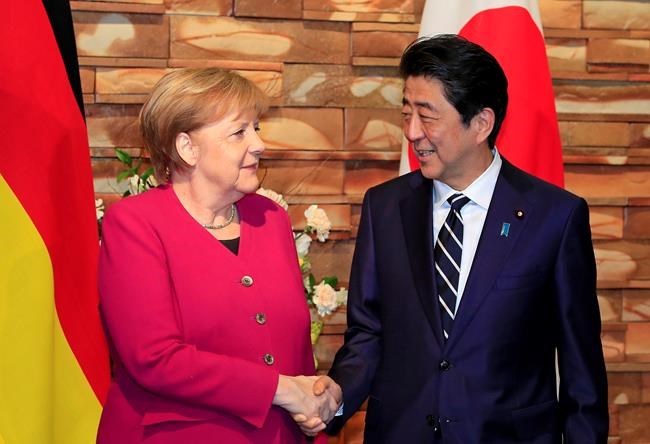
German Chancellor Angela Merkel, left, shakes hands with Japanese Prime Minister Shinzo Abe prior to their meeting at Abe's official residence in Tokyo, Monday, Feb. 4, 2019. (Franck Robichon/Pool Photo via AP)
Republished February 04, 2019 - 10:16 AM
Original Publication Date February 04, 2019 - 2:51 AM
LONDON - With Brexit just seven weeks away, Britain's ruling Conservative Party was locked in tense negotiations with itself Monday to rework the U.K.'s divorce deal with the European Union — as the EU stood firm in ruling out any renegotiation.
Meanwhile, pro-EU and pro-Brexit U.K. politicians traded allegations about whether Nissan's decision not to build a new SUV in northern England was the latest Brexit-induced damage to Britain's economy.
Britain is due to leave the bloc on March 29, and many businesses fear economic chaos if there isn't an agreement on the rules and conditions that will replace the 45 years of frictionless trade that came with being an EU member. The uncertainty has already led many firms to shift some operations abroad, stockpile goods or defer investment decisions.
Nissan announced over the weekend that it has decided not to build the X-Trail model at its existing U.K. plant in Sunderland, England, cancelling plans announced two years ago after May's government promised to ensure the carmaker's ability to compete after Brexit.
The company said it instead plans to consolidate production of the next generation X-Trail at its plant in Kyushu, Japan, where the model is currently produced. It will continue producing three other models at the Sunderland plant, which employs 7,000 people.
The company said it had made the decision "for business reasons," and it comes amid falling sales of diesel vehicles in Europe. But Nissan added that "the continued uncertainty around the U.K.'s future relationship with the EU is not helping companies like ours to plan for the future."
U.K. Business Secretary Greg Clark — a proponent of keeping close economic ties with the EU — said Monday that Nissan regarded the risk of a no-deal Brexit as "a source of damaging uncertainty." He said executives at the firm had "commented on the need for us to come together and resolve the question of our future trade relationship with the EU."
The automaker's decision is a blow to the government, which in 2016 offered Nissan incentives to stay in Britain. On Monday, the government published a previously secret October 2016 letter from Clark to Nissan promising up to 80 million pounds ($105 million) in support for the Sunderland plant.
The letter also said Britain would "seek to maintain the closest possible economic relationship between the U.K. and our European partners" and would try to ensure that carmakers' "ability to export to and from the EU is not adversely affected" by Brexit.
Carmakers are particularly concerned about Brexit because they rely on complex supply chains of parts from multiple countries.
With Britain's Parliament at odds over Brexit, Prime Minister Theresa May gathered pro-Brexit and pro-EU Conservative lawmakers into an "alternative arrangements working group" seeking to break the deadlock. The group was holding three days of meetings with ministers and civil servants to investigate possible changes to the EU divorce deal, which was rejected by Parliament last month.
The changes centre on replacing a measure known as the backstop, designed to keep an open border between the United Kingdom's Northern Ireland and EU member state Ireland.
The border area was a flashpoint during decades of conflict in Northern Ireland that cost 3,700 lives. The free flow of people and goods across the near-invisible frontier now underpins both the local economy and Northern Ireland's peace process.
May's office said she plans to travel to Northern Ireland on Tuesday to meet business leaders and make a speech underscoring the government's commitment to avoiding a hard border. But it's less clear than ever how Britain plans to achieve this.
The EU insists the Brexit withdrawal agreement can't be renegotiated, and has already rejected some of the arrangements under discussion in London, including a time limit on the backstop and unspecified technological solutions to customs checks.
EU Brexit negotiator Michel Barnier said that backstop remains "the only operational solution available" for an orderly exit of Britain from the EU.
Irish Foreign Minister Simon Coveney accused some British politicians of seeking "to essentially do away with an agreed solution between the U.K. government and EU negotiators and to replace this with wishful thinking."
German Chancellor Angela Merkel also said the agreement couldn't be renegotiated, although questions surrounding border arrangements could be addressed in a declaration on the future relationship between the EU and Britain.
Speaking during a trip to Japan, she said a Brexit agreement was still possible, but first "we must hear from Great Britain how they envision that."
May hasn't spoken to EU leaders since Wednesday, a day after British lawmakers instructed her to seek changes to the Brexit withdrawal agreement she had spent a year and a half negotiating with Brussels.
But May's spokesman, James Slack, denied that the Brexit process was deadlocked. He said the government was working with "urgency" on border solutions.
"What we are doing right now is working at home on the proposal we will take to Brussels," he said.
___
Raf Casert in Brussels, and Geir Moulson, in Berlin contributed to this story.
___
Follow AP's full coverage of Brexit at: https://www.apnews.com/Brexit
News from © The Associated Press, 2019